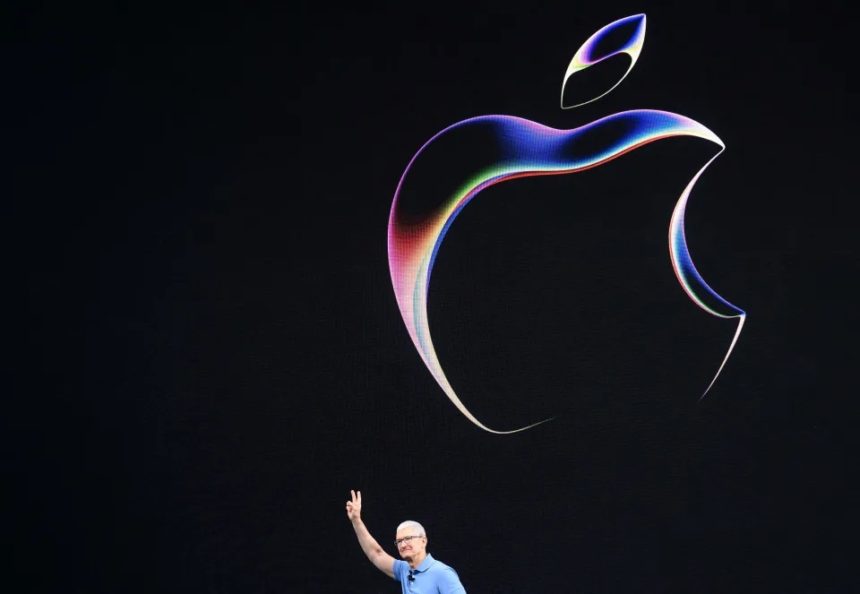Apple’s (AAPL) Worldwide Developers Conference event kicks off Monday, June 10, from the company’s headquarters in Cupertino, Calif., with a keynote by CEO Tim Cook. One of the most anticipated Apple events in years, WWDC 2024 is expected to serve as the launch point for the company’s big push into generative AI.
Wall Street is eager to find out what Apple’s been cooking up over the past few months as its rivals have begun rolling out, or in some cases rolling back, their own generative AI offerings. Apple has been largely on the sidelines of the AI conversation, save for a few fleeting mentions during earnings calls and the like.
During the company’s Q2 call in May, Cook seemed to tee up potential AI news from WWDC while touting Apple’s capabilities in both hardware and software.
“We believe in the transformative power and promise of AI, and we believe we have advantages that will differentiate us in this new era, including Apple’s unique combination of seamless hardware, software, and services integration; groundbreaking Apple silicon with our industry-leading neural engine; and our unwavering focus on privacy,” he said.
If that wasn’t enough, Apple’s marketing chief Greg Joswiak posted on X, formerly Twitter, that WWDC will be “Absolutely Incredible!” and made sure to capitalize both words. Get it? A.I.
In addition to unveiling its broader AI strategy, Apple will also debut the latest versions of its various operating systems, including iOS, iPadOS, watchOS, macOS, tvOS, and the first major updates to the company’s visionOS, which powers the Vision Pro mixed reality headset.
Still, everything else is virtually guaranteed to take a back seat to Apple’s AI news.
Siri gets smarter, and more
According to Apple soothsayer Mark Gurman of Bloomberg, the highlight of WWDC 2024 will be a new generative AI-powered version of Apple’s Siri smart assistant. The feature will allow Siri to control individual features within apps, making it far more versatile than the Siri on your current iPhone.
Siri has been languishing for years, proving more useful for setting timers and playing songs on Spotify than acting as a true digital helper. But a generative AI version of Siri offers the promise of an actual smart assistant that could provide you with everything from proactive tips to improved responses to those random questions that pop in your head throughout the day.
Bloomberg’s Gurman also says Apple’s AI features, called Apple Intelligence, will touch a host of other apps including Messages, Notes, and Safari, as well.
Exactly how Apple will power a smarter Siri is still an open question. According to reports from Bloomberg, the Wall Street Journal, and the New York Times, Apple has held talks with OpenAI to license its GPT software and separate talks with Google (GOOG, GOOGL) to license its Gemini software.
A tie-up with either company could get complicated. OpenAI already works closely with Microsoft (MSFT), which is working to set its PC business apart from Apple by boasting about how some Windows 11 features are powered by GPT-4o. Google, meanwhile, uses its Gemini AI model on its Android smartphones, which compete directly with Apple’s iPhone. Google is also working with Samsung to provide AI software for that company’s Galaxy line of phones.
It will also be interesting to see if consumers or Wall Street end up more excited about Apple’s AI rollout. Investors and analysts have been waiting for Apple to debut some kind of answer to the generative AI explosion, but so far consumer use cases have been relatively limited.
If Apple does roll out some well-developed features, they’re unlikely to get consumers to drop everything and buy a new iPhone come September when the company debuts its newest phones. Instead, most consumers will probably wait until they see some kind of hardware upgrade they’ve been waiting for, or until their current phone becomes unbearably slow, before ponying up for a new device.
As for iPadOS and macOS, expect Apple to roll out the same AI features it adds to iOS across those operating systems as well. In general, I expect Apple to be rather judicious with its AI moves. The company is keenly attuned to how consumers perceive its products, and after the blowback competitors like Google and Microsoft have seen with their own AI stumbles, it’s hard to imagine Apple will announce anything it isn’t completely confident in.
Outside of AI, Apple is also expected to unveil Rich Communication Services, or RCS, for the iPhone. This means that users will finally be able to text high-quality images and videos to their Android friends. RCS is also more secure than the SMS standard Apple currently uses for iPhone-to-Android texting.
Gurman also says that Apple will finally allow people to arrange app icons on their iPhone home screen in any way they want, rather than being stuck with the traditional grid layout.


